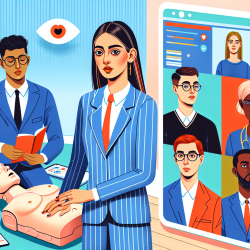As a practitioner in the field of special education, you are likely aware of the critical importance of Basic Life Support (BLS) training. But did you know that tailoring BLS training to specific populations can significantly improve outcomes? A recent scoping review titled Tailored Basic Life Support Training for Specific Layperson Populations—A Scoping Review delves into this very topic. Let’s explore how you can leverage the findings from this research to enhance your skills and better serve your community.
Why Tailored BLS Training?
The research highlights that tailored BLS training is not just feasible but also crucial for specific populations such as individuals with disabilities, refugees, and even schoolteachers. Standardized BLS courses, while effective, may not address the unique needs of these diverse groups. Tailored training can bridge this gap, making BLS education more inclusive and effective.
Key Findings
- Individuals with Disabilities: Tailored BLS courses for individuals with Down syndrome, blindness, and hearing impairments showed that participants could perform BLS effectively. These courses included shorter sessions, lightweight educational materials, and tactile approaches.
- Refugees: Tailored courses for refugees included translators and focused on general health literacy, demonstrating the feasibility of BLS education for this group.
- Schoolteachers: Tailoring BLS training for schoolteachers can empower them to teach BLS to students, thereby extending the reach of life-saving skills.
How to Implement Tailored BLS Training
Here are some practical steps you can take to implement tailored BLS training in your practice:
1. Identify the Specific Needs
Start by identifying the specific needs of the population you are working with. This could involve understanding their physical abilities, language barriers, or professional backgrounds.
2. Adapt the Curriculum
Modify the standard BLS curriculum to address these needs. This could include shorter sessions, using visual aids, or incorporating sign language interpreters.
3. Use Specialized Instructors
Engage instructors who are trained to work with specific populations. Their expertise can make a significant difference in the effectiveness of the training.
4. Conduct Pilot Sessions
Before rolling out the program, conduct pilot sessions to test the effectiveness of the tailored curriculum. Gather feedback and make necessary adjustments.
5. Continuous Evaluation
Regularly evaluate the program’s effectiveness through assessments and feedback. Continuous improvement will ensure that the training remains relevant and effective.
Encouraging Further Research
While the existing research provides a solid foundation, there is a need for more comparative studies to determine the effectiveness of tailored versus standard BLS training. As a practitioner, you can contribute to this body of knowledge by documenting your experiences and outcomes.
To read the original research paper, please follow this link: Tailored Basic Life Support Training for Specific Layperson Populations—A Scoping Review.










